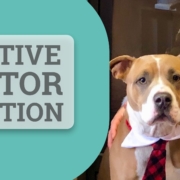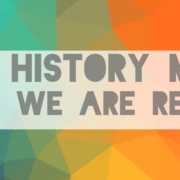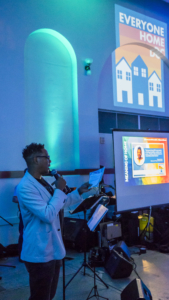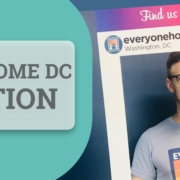❤ 2020 Executive Director Reflection ❤
2020. What an unbelievable and unexpected year it has been! When we sat down at the end of last year to reflect and plan for the year ahead, a global health crisis was not on the vision board. Nor was a national reckoning with police violence against Black Americans that sent millions of people into the streets to declare Black Lives Matter.
This year, we have all been tested personally and professionally in ways we could never have imagined. As I look back, I am overwhelmed with appreciation for our smart, skilled, compassionate, and dedicated staff and Board of Directors. They have worked tirelessly and continuously reimagined how Everyone Home DC provides critical services and resources for individuals and families at risk of or experiencing homelessness during this unprecedented and constantly evolving time. And my heart is full as I remember how we lifted each other up as we experienced anxiety, isolation, grief, and rage as we witnessed so much loss and the disproportionate toll the pandemic and police violence took on Black people and those who had already been struggling.
All of us at Everyone Home DC are filled with extreme gratitude for the love we have felt from our amazing champions (YOU!). You have reached out to ask how to help, shared words of encouragement, and made donations that enabled us to respond with flexibility and efficiency over these last nine months. Thank you!
2020 introduced new situations never before experienced in Everyone Home DC’s 50 years of existence. Thanks to your support, we continue to provide urgent and critical resources to the individuals and families we work with who are feeling far more exposed to the harshness of our new reality. In 2020:
- Our Street Outreach team did COVID health checks and distributed undergarments, body wipes, hand sanitizer, and other items essential to the health and safety of those with no place to shower or wash their hands, and ensured that everyone had enough to eat.
- Our family housing and prevention programs pivoted seamlessness to remote and limited in-person case management to safely support families, ensuring housing stability and access to much-needed resources and support. As Everyone Home DC families are at high risk for COVID-19, attending to their physical and mental wellbeing has been a critical part of the care we’ve provided this year.
- After a brief pause in service to establish safety protocols and secure necessary supplies, our drop-in day center, Shirley’s Place, reopened to provide laundry, showers, mail pickup, grab and go snacks and toiletry bags, and emergency clothing.
- Our first-ever digital campaign—September Challenge, in the Spirit of Sip and Savor—far exceeded our expectations and raised more than $70,000, with close to 400 donations made throughout the month.
- The traditional in-kind donation drive for back to school, Thanksgiving, and holiday gift-giving shifted from distributing goods and items to giving gift cards, which have offered families the flexible support they need during this time. We collected nearly $40,000 from more than 200 donors, which we quickly distributed to our housing program families.
- We advocated strenuously to preserve DC funding for homeless services, housing, and social safety net programs in the face of enormous revenue shortfalls.
None of this would be possible without you. In a year when everything has felt so incredibly different, your support has remained constant, offering Everyone Home DC much needed stability and inspiration. Thank you for standing with us during this historic year. With your support, Everyone Home DC plans to be here not just today but in the months and years ahead, working as a community to ensure that the needs of our most vulnerable residents are at the center of a just recovery. Thank YOU for helping Everyone Home DC make it through 2020. As we look towards 2021, we are confident we will get through the challenges ahead together.
With warm wishes for a joyful holiday season,
Karen Cunningham
Everyone Home DC
Executive Director





 For my final thought this evening I would like to talk a little bit about the hashtag #HousingEndHomelessness. It seems obvious doesn’t It? Just as food ends hunger, Housing ends homelessness, and yet tonight, in this city, the capitol of our nation, over 6000 souls, adult and child, will be going to bed without a home to call their own.
For my final thought this evening I would like to talk a little bit about the hashtag #HousingEndHomelessness. It seems obvious doesn’t It? Just as food ends hunger, Housing ends homelessness, and yet tonight, in this city, the capitol of our nation, over 6000 souls, adult and child, will be going to bed without a home to call their own.